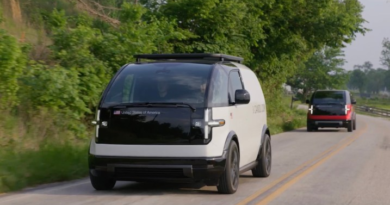Venti raises $29M to designed autonomous vehicles for industrial and logistics hubs
We are still likely many years away from wide-scale deployment, let alone adoption, of fully autonomous vehicles on our streets, but in the meantime, autonomous vehicle companies focusing on closed-campus environments continue to raise funding and make headway in building self-driving on a smaller scale.
In the latest, a startup called Venti Technologies has raised $28.8 million, a Series A that it plans to use to continue building its software, partner with third parties for hardware (that is, vehicles), and to secure more deals.
Its target customer comes from the wide range of supply chain businesses that operate across warehouses, ports and other shipping and logistics environments where vehicles — currently driven by humans — are central to operations. Venti’s bet is that even with the high prices associated with self-driving vehicles, industrial customers, a market that generates billions in revenues annually, will pay up, because it will pay off for them in the long term.
“If you have a big logistics facility where you run vehicles, the largest cost is human capital: drivers,” Dr. Heidi Wyle, Venti’s CEO and co-founder, said in an interview. “Our customers are telling us that they expect to save over 50% of their operations costs with self-driving vehicles. Think they will have huge savings.”
LG Technology Ventures, the VC arm of the LG Group, is leading this round, with Safar Partners, UOB Venture Management, and previous investors Alpha JWC and LDV Partners also participating. Venti last raised $8 million in the summer of 2021. Valuation is not being disclosed.
Venti is coming at the industrial market after getting its fingers burned a little from its initial ambitions in the consumer market.
Founded originally out of work on robotics and related fields done by co-founder Daneila Rus at MIT (“she invented autonomy” is how Wyle likes to describe it), the startup’s early efforts were in areas like SUVs and robo-taxi models. But as Wyle recalls, the startup discovered that the complexity of the scenarios was ultimately insurmountable.
“What I’ve seen is that robo-taxi is an extremely difficult problem to solve,” she said. “All of the chaos of the world is sitting in those city streets. Industrial environments are utterly different. It’s not a sexy space, but the global supply chain is huge and it got whacked in COVID. They are still digging themselves out of that and we enable them to work better [now] and if another thing like COVID comes along.”
The bonus of campus environments is not just that the spaces in which they operate, and the variables at play, are both finite and definable, but typically, the whole operation is carried out at much slower speeds, which makes it easier to correct errors when and if they do arise.
That being said, the company is not yet in fully-autonomous mode even in the closed environment. Wyle declined to name any of its customers, vehicle partners, any specific pilots it is running, nor pricing for its software and hardware. Competition is super-fierce for business in this space, I suspect.
But she noted that the pilots it is running involve drivers behind the wheels of its vehicles, and that it is working closely with manufacturers of logistics vehicles to fit the first of these that will be fully-autonomous with no driver assistance and no drivers behind the wheels.
“We allow our customers to give us wheels and then we oversee a ‘drive-by-wire’ conversion,” she said, referring to the retrofitting and putting the electronics in place to run them as autonomous vehicles. “After this year, we will move into production-grade vehicles for a big port manufacturer.”
That software, she added, is based on what Rus worked on initially at MIT and “does all the core autonomy that runs in the vehicle,” which includes logistics algorithms that are tailored to Venti’s target market segments. Ultimately, even when vehicles are not “manned” by humans, there will likely be people in control centers monitoring and potentially intervening in the vehicles’ movements if needed, Wyle said.
Venti is not the only one chasing this opportunity. Others in the same space include EasyMile (which has been on the radar of VCs), Outrider (which raised a big round this year), and Aidrivers.
LG, an industrial giant itself both as a primary business and as a supplier to industrial businesses, is not a strategic partner currently, but Wyle said that this is the long-term hope.
“Venti is solving real-world problems for large customers in huge markets with technology that has proven safe, mature and capable of near-term driverless deployment,” said Anshul Agarwal, MD at LG Technology Ventures, in a statement. “We are impressed not only by the technology, which is more complete and rapidly able to provide value to end customers, but also by the world-class team.”




